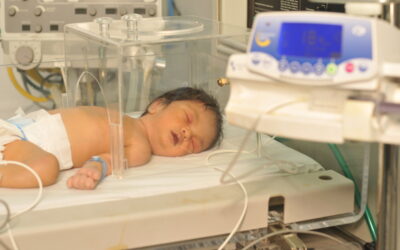Introduction Welcome to ONP Hospital, where the future of neonatal care unfolds within our state-of-the-artNeonatal Intensive Care Unit (NICU). Our commitment to delivering the highest standard of carefor our tiniest patients is evident in the cutting-edge technology,...
Child tucked into bed with white covers you’ve ever been woken at night by your child screaming and thrashing in bed only to realize they’re still asleep, chances are your child is experiencing a night terror. While these episodes are alarming to witness, they are usually not causing concern. It is much harder on the parent to watch [a night terror] than it is on the child to experience it, days Dr. Amita Phadnis, CMD and HOD of Pediatrics and Neonatology department at Oyster and Pearl Hospital, Pune.
What are night terrors?
Night terrors are a fear reaction that disrupts sleep. They generally occur during the first third of the night as your child transitions from the deepest stage of sleep to a lighter one.
During a night of terror, your child may:
Sit upright
Shout or flail
Be unaware of their surroundings
Not respond when spoken to
Sweat, breath very fast, have a rapid heart rate and dilated pupils
How are night terrors different from nightmares?
Night terrors are often confused with nightmares. A key difference is that children often wake up during nightmares and remember each scary detail. That’s because nightmares occur during the rapid eye movement (REM) stage of sleep when your child is dreaming.
During night terrors, children remain in a deep, non-dreaming stage of sleep, even though they may appear to be awake. They have no memory of the night terror when they wake up the next morning because night terrors have no mental images associated with them.
As children don’t remember these episodes, it’s best not to describe or reenact them, either to your child or within their earshot.
Night terrors do not create a visual memory, so your child cannot describe what triggered the episode “But children are observant and if their caregiver retells a scary nighttime event, it can scare the child.”
What triggers night terrors?
Night terrors are most common in children ages 4-12 and often disappear entirely by the time a child reaches their teens. While night terrors tend to happen randomly, the tendency to have them may run in families.
Night terrors may be triggered by:
Caffeine
Medications
Illness
Being overtired
Sleeping in a new environment
What should I do while my child is having a night of terror?
As a parent, your natural instinct may be to console your child. But waking your child from a night terror may disorient and confuse them. Remember, your child is in a deep sleep and will have no memory of the episode.
It is recommended to stay nearby your child – to ensure they are safe – until the night terror passes. Most episodes don’t last more than a few minutes.
Children with night terrors may also sleepwalk. If your child sleepwalks (or has in the past) make sure all entryway doors and windows are locked and that the sleeping environment is safe each night before bedtime.
Is there anything I can do to prevent night terrors?
Being overtired or feeling stress are known triggers for night terrors. It is recommended that parents try the following to calm and relax their children before bedtime:
Make time for young children to nap during the day so they don’t get overtired.
Create a calming and simple nighttime routine, such as a warm bath and a book or puzzle before bed.
Stick to a consistent bedtime for your child.
If your child experiences repeated night terrors or other sleep-related issues, such as snoring, sleepwalking, or bedwetting.
Rest assured: Most children outgrow night terrors. And when that happens, the entire household will sleep more soundly.
Stay in Touch
Are you looking for advice to keep your child healthy and happy? Do you have questions about common childhood illnesses and injuries?
Talk to our expert Dr. Amita Phadnis, with 35+ years of experience in pediatrics and Neonatologist.
To book an appointment contact: http://onphospitals.com/



